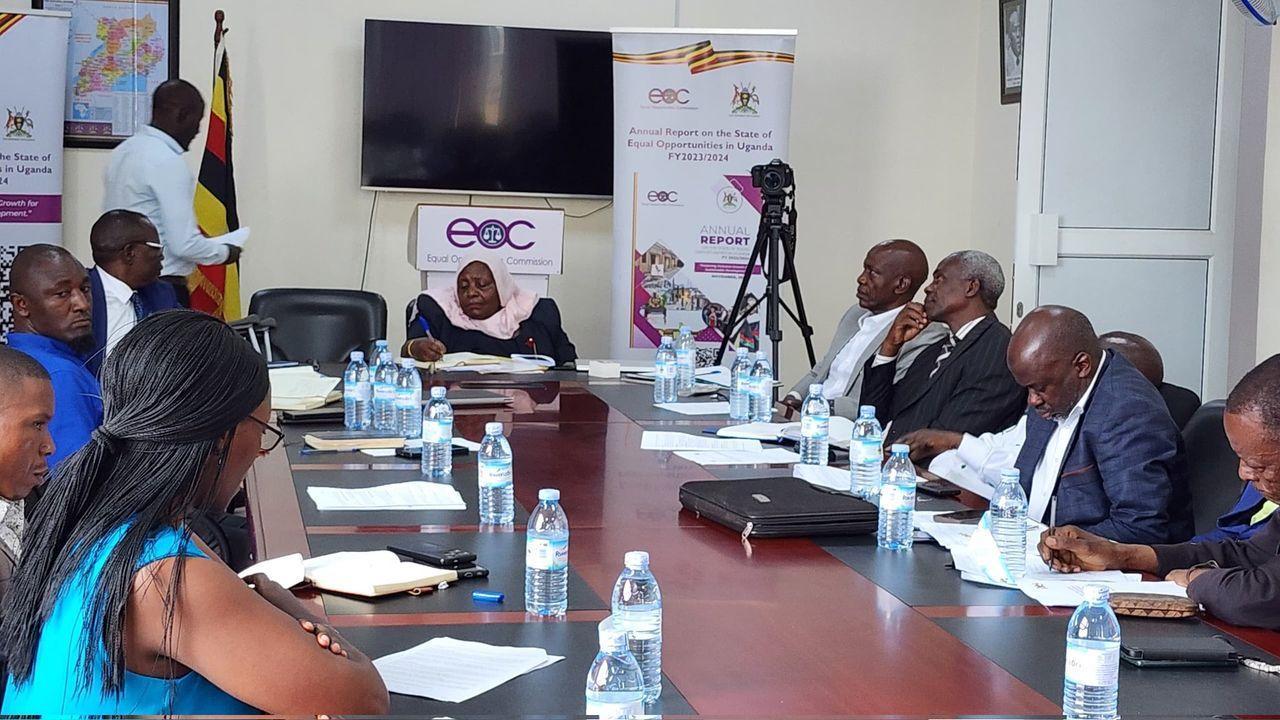Africa-Press – Uganda. The Equal Opportunities Commission (EOC) has raised serious concerns over the continued exclusion of marginalised groups from Uganda’s political processes, warning that the country’s democracy could stagnate if urgent reforms are not undertaken ahead of the 2025/2026 general elections.
The warning came during a high-level engagement involving Secretary Generals and Electoral Commission officials from all active political parties in Uganda.
The meeting focused on addressing gender and equity barriers that hinder vulnerable populations from fully participating in electoral processes.
EOC Chairperson Safia Nalule Jjuuko emphasised that despite Uganda’s strong constitutional and international commitments to inclusive governance, systemic obstacles still prevent meaningful participation for key groups.
These include women, youth, persons with disabilities (PWDs), ethnic minorities, older persons, and Ugandans living under special circumstances such as illness or incarceration.
Jjuuko called for comprehensive reforms to dismantle these barriers and ensure that all citizens can engage equally in the country’s democratic processes.
“Equal opportunities in political participation are not just a constitutional requirement. They are essential for equitable development and ensuring every citizen has a fair chance to shape the nation’s future,” Nalule said.
She pointed to several provisions in Uganda’s Constitution, such as Articles 38 and 32, which guarantee the right of all citizens to participate in governance and call for affirmative action for marginalised groups.
However, these guarantees remain largely aspirational, as structural, legal, and logistical barriers persist.
According to the EOC’s annual report, local government positions such as Local Council Chairpersons are overwhelmingly dominated by men, with women occupying only 3% of LC1 positions and just 6.5% at LC3 level.
The youth, despite constituting 23.5% of the population, also remain sidelined due to financial constraints, internal party politics, and lack of dedicated structures for youth with disabilities.
“For young people, high unemployment breeds apathy and vulnerability to manipulation. They are often used as tools in political violence rather than empowered as leaders,” Nalule noted.
She called for comprehensive reform of campaign strategies and leadership development programs.
PWDs face additional challenges such as inaccessible polling stations, lack of adapted materials like Braille ballots, and inadequate sign language interpretation.
Only 15 interpreters are currently available nationwide, far below demand.
Nalule emphasised that this violates both Uganda’s domestic laws and the UN Convention on the Rights of Persons with Disabilities.
Ethnic minorities, older persons, and Ugandans abroad or in detention were also cited as systematically marginalised.
For example, older citizens with mobility challenges are often excluded from civic education activities and polling centers. Meanwhile, Uganda’s electoral framework offers no mechanism for diaspora or incarcerated populations to vote or contest elections.
The Commission also raised concerns over the “national constituency” model used for interest groups such as women, youth, and PWDs, which requires candidates to campaign across vast geographical areas placing a heavy financial and logistical burden on already vulnerable groups.
Nalule described how individuals vying for party endorsements are often forced to campaign under uncertain conditions with shifting voter bases and limited transparency in internal elections.
“They are wandering in the wilderness,” she said, urging reforms to enable regional-based voting for national representatives.
Highlighting financial exclusion, Nalule cited the 2021 elections where parliamentary nomination fees ranged between Shs3 million to Shs5 million, with presidential candidates paying Shs20 million.
“These figures shut out many potential candidates from poor or marginalised backgrounds,” she said.
To address these challenges, the Commission proposed a raft of recommendations including the establishment of quotas for ethnic minorities, public financing for candidates from disadvantaged backgrounds, reforms to enable voting by Ugandans abroad and in detention, and greater accessibility measures such as Braille and sign language services at polling stations.
Political parties were urged to champion inclusive candidate selection processes and remove the practice of voters lining behind candidates, which the Commission said deters participation from the elderly and PWDs.
“Let us unite to create a political environment where every citizen, regardless of their background, has equal access to the electoral process. Together, we can build a democracy that is not only strong in numbers but rich in diversity and fairness,” Nalule said.
For More News And Analysis About Uganda Follow Africa-Press






